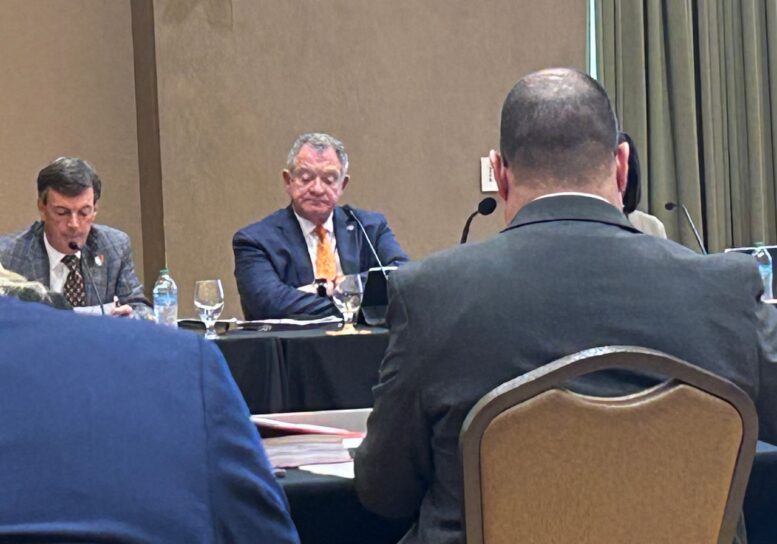By DAVID DUPONT
BG Independent News
The BGSU Board of Trustees Friday adopted on unanimous votes a series of five resolutions force fed to them by the state to comply with Senate Bill 1.
The “Advance Ohio Higher Education Act” was passed by the legislature and signed by the governor this spring.
The legislation faced stiff opposition from professors and administrators.
The resolutions call on the university to:
- “Educate students by means of free, open, and rigorous intellectual inquiry to seek the truth without favoring any ideology and not prohibit speech or lawful assembly,” as well as “to create a community dedicated to an ethic of civil and free inquiry, which respects the autonomy of each member, supports individual capacities for growth, and tolerates the differences in opinion that naturally occur in a public higher education community. “
- Eliminate all considerations of diversity, equity, and inclusion in hiring and the creation of new scholarships, and the elimination of all DEI programs and offices.
- Establish a workload policy and penalties for faculty members who do not comply with the provisions.
- Use standard state determined questions in student evaluations. These questions have yet to be crafted by the Chancellor of Higher Education, except for one: “Does the faculty member create a classroom atmosphere free of political, racial, gender, and religious bias?”
- Implement a faculty annual performance evaluation policy, post-tenure review policy, and tenure and retrenchment polices. This resolution stipulates that student evaluations will account for at least 25 percent of the teaching component of a faculty evaluation. This provision will not be imposed until the current contract with the Bowling Green Faculty Association expires on June 30, 2027.
After the morning Academic Affairs and Student Success Committee Meeting, President Rodney Rogers reasserted his belief that it is good for the principles of academic freedom to be enshrined in law.
“It won’t change how we do our work. It will, I think, raise the awareness to make sure we do our work the right way, where everyone is given opportunities to debate ideas,” he said. “We always done these things.” But some people outside the institution, and maybe some inside, don’t believe the university has been doing this, he said.
“Education is about debating ideas,” Rogers said. “Whether you’re liberal, conservative, libertarian, whatever your philosophy may be, whatever your religion may be, whatever your idea may be, your perspective, we have to honor all of that and learn together.”
(This comes at a time when the Trump Administration is cracking down on international students nationwide who have spoken out about the Israeli military action in the Mideast.)
Rogers did say he is concerned about the legislation’s approach to the concept of diversity, equity, and inclusion.
“I always get concerned when we identify certain words and say those words we have to censor,” he said. “I just don’t think that’s healthy for any society.”
He agreed that this does “seem like a contradiction” to other assertions elsewhere about the importance of free speech.
“The reality is we are in this time, and we have to stay true to our guiding principles,” he said, “which is we will engage our students and our fellow faculty and staff in lively debates, talking about ideas, making sure our students are prepared for great careers and great lives. But from a very pragmatic standpoint, we will find our way through this.”
In his report to the trustees in the business meeting Friday afternoon, outgoing president of the Faculty Senate Allen Rogel praised the administration’s handling of the demands of Senate Bill 1.
Rogel said “the deliberate measured approach” taken to demands from the state and federal government has meant that BGSU has not made “reactionary changes” seen at other schools.
Instead they waited to see what the actual legislation said. This has allowed BGSU to position itself in a way that made certain actions unnecessary.
In particular, Rogel pointed to the merging of six international language majors into one major with six specializations. (SB 1 requires the elimination of majors with few students.)
The Faculty Senate, he said, looks forward to continue to working with the administration in developing the university’s response to requirements imposed by the state and federal government.





